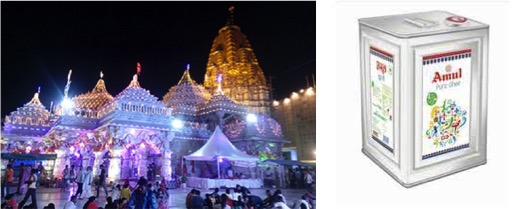The FIR comes in the wake of Food and Drug Control Administration finding that the prasad served by Mohini caterers at the Ambaji temple in Gujarat’s Banaskantha district had failed to meet the required quality standards
Sabarkantha District Milk Producers Union Ltd, commonly referred to as Sabar Dairy, has filed a first information report (FIR) against Mohini Caterers, the supplier of Mohanthal sweets, alleging that the agency had been using substandard ghee and falsely labelling its products as ‘Amul’.
Sabar Dairy is one of the milk unions under Gujarat Co-operative Milk Marketing Federation (GCMMF) that markets dairy products under the brand name of Amul. The FIR comes in the wake of the Shree Arasuri Ambaji Mata Devasthan Trust (SAAMDT), the governing body of the Ambaji temple in Gujarat’s Banaskantha district, terminating its contract with Mohini Caterers, after the Food and Drug Control Administration (FDCA) found that the prasad served by Mohini caterers at the temple had failed to meet the required quality standards during laboratory testing.
The FDCA had collected samples from the temple ahead of the Bhadarwi Poonam festival, an annual traditional fair that draws over 40 lakh pilgrims, which was held from September 23 to 29. As a result, the 180 ghee tins supplied by Mohini Caterers were sealed.
Sabar Dairy lodged a complaint against Mohini Caterers and other unidentified individuals linked to the distribution of substandard ghee at the Ambaji Police Station on September 30.
“The ghee tins bore the Amul labels and mentioned that they were packed by Sabar Dairy. However, Sabar Dairy has categorically and vehemently denied the same. Investigations have revealed that the ghee tins supplied by Mohini Caterers to the temple trust bore duplicate labels of Sabar Dairy,” said the FIR.
Mohanthal, a delectable sweet, holds significant cultural importance in many western states of India, often offered to deities and savored during special occasions like weddings.
The FIR mentions that the batch numbers, tin specifications, and labels on the sealed ghee tins do not conform to the quality standards established by the Amul Federation. “The evidence clearly shows that Mohini Caterers knowingly supplied substandard ghee to the temple trust and tried to malign Amul’s reputation,” the milk union has alleged.
“The preparations at Ambaji temple for Bhadarwi Poonam commence three months ahead of time. As of August 28, the Food and Drug Control Administration (FDCA) had already collected samples for the prasad. Even before the results were in, concerns had arisen regarding the quality of the ghee. As a precautionary measure, the existing stock was sealed following failed sample tests. In response, the temple authorities swiftly arranged for ingredients from Banas Dairy as a temporary solution to ensure the smooth progress of the festival,” said Varunkumar Baranwal, the district collector for Banaskantha and Chairman of SAAMDT, the Ambaji temple trust.
Given the significance of the occasion and the temple’s immense footfall of approximately 48 lakh visitors, stringent quality checks were enforced, and about 2 lakh kgs of prasad were prepared under rigorous supervision, he added.
“On September 30, the contract with Mohini Caterers was terminated due to these quality concerns. It’s worth noting that the temple staff is also part of the FIR application,” said the collector.
GCMMF managing director Jayen Mehta, in a statement on Tuesday, said that no dairy union affiliated with the federation is engaged in such activities. He reiterated that the Amul ghee available in the market is authentic and of high quality.
Source : The Hindustan Times Oct 03rd 2023
“

